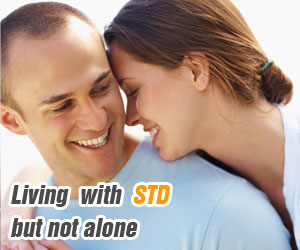Recurrences and Outbreaks
When Herpes Simplex Virus becomes active, it begins to multiply, and then comes to the surface along the nerve paths. Reactivation may be symptomatic or asymptomatic – there may be signs and symptoms, or there may be no signs at all. Due to the nature and structure of the neural pathways, recurrences of herpes may not always appear in the same exact place. However, they will remain in the same general area – in genital Herpes infections, perhaps migrating a few inches in the genital region, or showing up on the upper thigh, or the buttocks. Many times, genital herpes outbreaks appear in the anal region.
Some have theorized that herpes takes the “path of least resistance” when coming to the surface, which may explain why some people have their recurrences in the same spot time after time, and why other people’s outbreaks change to an area like the anus where there may be repeated abrasion as a trigger.
Recurrence rates vary greatly, and studies indicate that as many as 80 to 90% of people infected with HSV will experience recurrences, generally within 3-6 months after initial outbreak. Genital HSV recurs an average of 5 times per year, more or less, depending of course on various factors, including viral type & site, therapies, the individual’s immune system, emotional state, personal trigger factors, and even environmental factors. Some women notice recurrences around their menstrual periods. The recurrence rate is usually much lower in those whose genital infections are caused by HSV-1. Oral HSV-2 normally recurs much less often than HSV-1, statistically about once every ten years.
Recurrences are usually less severe and of shorter duration than first episodes. Recurrences generally become less frequent as time passes. However, major emotional events, or specific stressors, such as an illness, or friction, or Environmental Factors like sunburns, can trigger recurrences where one may have been mostly free of herpes virus activity beforehand.
Signs of an Oncoming Herpes Outbreak: Prodrome
The state or set of symptoms that precede a Herpes outbreak is called “prodrome.” The first sign of an upcoming occurrence, prodrome can occur from 30 minutes to a few days prior to an outbreak. Prodrome may include tingling, itching, and/or burning sensations at the site of impending outbreak, and/or shooting pains, numbness, aches, or other sensations in the lower back, buttocks, or thighs (in genital infections). Other possible symptoms are fever, headaches, soreness, and swollen lymph nodes. Prodrome may also include an onset of listlessness and irritability, as well as increased sensitivity to environmental factors. When any of these symptoms are present, consider the Herpes Virus active and risk of transmission is high.
Anal Herpes outbreaks are common, regardless of the initial location of genital infection. This could be due to the increased potential for irritation in that area. Sometimes, people mistake an Anal Herpes recurrence for hemorrhoids or piles. Any irritation in the genital area should be a caution to the possibility of HSV activity on the skin.
Some people feel a few or many of the above Prodrome sensations from time to time without having full-blown outbreaks or any visible signs. Again, even though there may be no visible symptoms, the virus is active at these times, and precautions should be taken to avoid transmission. Others have some or all of these symptoms, with or without outbreaks, or after outbreaks, that last for days, weeks, or months in some cases. This is called Post-Herpetic Neuralgia. (See our special article about this condition on the Neuralgia page of HerpeSite.)
Most people who’ve had HSV-1 or HSV-2 for a few years learn to recognize their own set of prodrome signs. When they feel an impending outbreak, they take precautions against transmission to others, and also often can take steps to prevent a full-blown outbreak by increasing healthy diet and lifestyle choices, reducing stressors, and/or taking prescription anti-viral medications.
Triggers and Factors that Bring on Outbreaks
Triggers and Environmental Factors are many, and vary with each person. Some of the more common triggers for outbreaks are rubbing, chafing, friction, overexposure to wind, cold, wet, heat, sun (especially sunburn), restrictive clothing, and sweating.
Extreme environments of any sort, be they physical, emotional, auditory, etc., may create more stress chemicals in the body, and subsequently trigger nerve response that may possibly increase reactivation of HSV.
Foods reported by some to affect outbreaks include coffee, chocolate, nuts, popcorn, and alcohol.
Women report a tendency to be more susceptible to outbreaks around menstruation. Tampons are reported by some women to aggravate Herpes, probably due to the friction or chafing with insertion and removal. Wearing tight underwear or pads that rub or chafe can irritate the area and possibly precipitate an outbreak. Some women also report irritation from standard feminine hygiene products, and find non-chlorinated, natural cotton brands to be less irritating. Seventh Generation makes a great line of chlorine free personal products, including feminine hygiene, wipes, and soaps. A favorite personal soap that’s mild and non-irritating is California Baby Super Sensitive Shampoo & Body Wash.
Some people have discovered that regular bath & body soaps, laundry detergents, and other personal care products can irritate their mucous membranes and cause outbreaks. If you suspect you may have irritation from soaps, etc, try eliminating personal products, soaps, and laundry care products with fragrances, chlorine, and other potential irritants. Seventh Generation also makes a line of laundry products with either no fragrance or natural fragrances, that are gentler on the skin than traditional detergents.
Friction, rubbing, and vigorous sexual activity. People who engage in sexual penetration or any vigorous sexual activity can lessen chances of aggravation of HSV sites by using adequate lubrication and refraining from overly-vigorous activity or rubbing of the areas. Please note that lubricants and condoms containing nonoxynol-9 may actually irritate the skin and promote outbreaks.
Personal and lifestyle factors which may directly influence recurrence include stress, lack of sleep, poor diet, fatigue, and illness. You will discover your own personal triggers and learn to avoid or mitigate them.
Most people find that Herpes outbreaks tend to reduce in both number and severity as time goes on. Much depends on how well you take care of yourself physically and emotionally. More tips on how to improve your physical and emotional well-being to support a healthy and strong immune system can be found on the Health & Wellness page of HerpeSite.





